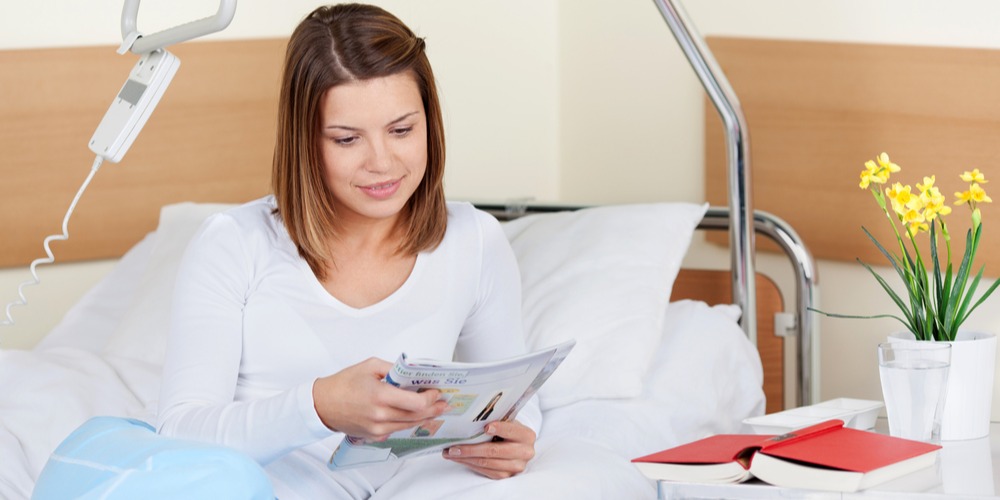How Important Are Hospital Patient Entertainment Systems?
5 minute read | 17/09/2021
.jpeg?width=7359&quality=low)
New, innovative hospital entertainment systems offer patients and staff more than their legacy predecessors could once provide. As hospitals have been feeling the strain due to the COVID-19 pandemic, these systems are now more important than ever, with the latest improvements helping patient satisfaction and saving the NHS money.
- What do patients currently have access to?
- Patient entertainment systems: How they help
- What’s the future of patient entertainment?
What do patients currently have access to?
Legacy Bedside Units
In 2005, hospitals began to introduce the entertainment systems we’re all now accustomed to. Screens are attached to movable “arms” that patients can pull towards the bed or push away as necessary. These Bedside Units (previously owned by Hospedia) were revolutionary at the time. Before this, patients had to make do with a radio in the ward to listen to music or a shared TV placed high up in the corner of the room. If patients had a bed that didn’t have a great view, they were out of luck. Remember, this was before the invention of the first iPhone.
The founding company of these Bedside Units, Patientline, invested £150,000,000 worth of infrastructure for the NHS to install 56,500 bedside units across 160 hospitals. This investment was given to the NHS for free, which meant that paying off the installation, and continuous running of the service, was funded by the patients when they paid for entertainment. This model carried on when Hospedia acquired Patientline in 2008 and is still running after SPARK TSL acquired Hospedia in 2021. This is because The cost of TV goes towards the maintenance of the units which covers 24/7/365 support, health and safety checks, replacement of parts and the engineers that repair the units.
This patient pays model is now outdated and needs to go. But if there are no other funds in place to support the existing service, thousands of patients wouldn't have access to basic entertainment such as TV. Learn about SPARK's vision to remove the patient pays model in this blog.
Hospital WiFi
Hospital WiFi was mandated to be free for patients to access by 2020 after the announcement in 2015. Before this, patients and visitors also had to pay for that too. Although many patients have a smartphone with 4G/5G that they can use to access entertainment online, there is still an expectation to have access to WiFi. This is because of data plan limitations as well as bad signals in some areas of hospitals. The need for WiFi is still very much there, but it now needs to be faster and stronger than before as it competes with 4G and 5G.
Patient entertainment systems: How they help
Boredom is common in hospitals. Patients are isolated from their friends and family for long periods and are without many distractions from their regular routines.
For some, an entertainment system and access to live TV and the latest shows on-demand can help pass the time or distract them from the issues they might be facing. It also provides a sense of home comforts.
Some entertainment systems have functionality included that patients can use when they want to make a request to staff. By using the screen at their bed, they can send a request directly to the required member of staff, reducing inefficiency and giving healthcare professionals more time to complete their other work commitments.
This same request system can be used to reduce food wastage in hospitals. Meals are currently being sent to patients that may have been moved or discharged. Portion sizes aren’t changed depending on the patient groups that food is being prepared for.
In total, it’s estimated that avoidable food waste costs the NHS £230 million each year. Money that could be better spent elsewhere.
With an entertainment system that’s part of a wider engagement platform, patients can make their food requests electronically. There’s no need to take orders 24 hours in advance, during which time the patient may have left or may just want something else to eat. This increases the number of meals that reach the right destination and are actually eaten.
These platforms can be personalised to each patient’s experience. Medical staff can use these screens to illustrate their plans for treatment and the issues a patient might be having. For example, it’s an easy way of bringing up the x-rays of a patient or showing an informational video covering something they might be having trouble understanding.
Get the Latest Insights on the Future of Patient Experience
Our 'Shaping the Future of Healthcare Together' webinar is now available on-demand.
Our panel address key questions while discussing how they're working to change the future of patient experience.
Access your recording of the webinar by filling out the form.

What’s the future of patient entertainment?
Cutting-edge systems have completely transformed the patient experience. Not only do they improve overall satisfaction, but each use from patients can also shape positive changes to NHS services.
Throughout the COVID-19 pandemic, technology such as this has been instrumental in ensuring patients still receive their care while maintaining a safe distance from others.
Being away from loved ones while in hospital is difficult, but this has been made even harder due to the pandemic. As families haven’t been allowed to visit their loved ones, having access to WiFi has been essential to keeping in touch with family members.
Interactions with other patients and staff has also been limited, which has called for greater access to entertainment to lower boredom and improve satisfaction as much as possible.
More so, it's known that patients who are educated in their illness and what they can do at home are less likely to return to the hospital. Due to the pandemic, this has never been more important. The SPARK TSL platform gives patients access to a bank of educational content that’s tailored to their specific healthcare needs, enabling them to gain valuable knowledge that will aid their recovery.
The systems are vital additions to hospital wards, improving the experience of not only patients but also the staff. They help Trusts to make vital savings and give them the tools and knowledge they need to make further improvements in the future.
This is all emphasised via our SPARK Fusion® bedside platform. This free solution enables patients more control of their entertainment across a single unifed system that also encompasses all other healthcare features.
Discover what SPARK Fusion® could do for you
Whether you'd like to provide fast and reliable WiFi or streamline administrative processes, you can with SPARK TSL. It's a system that never stays static and always evolves in line with patient expectations. Discover the platform and its latest update by clicking on the link below.
About the author
Rebecca O'Donovan
Becky is the Marketing Director at SPARK TSL, of whom she has worked for since 2012. She is responsible for high-level marketing strategy focusing on lead generation and aiding the vision of the business to ensure business growth.
More articles by the author
Related articles
 Healthcare Industry
Healthcare Industry
How Important is WiFi for Hospital Patients? | SPARK TSL
There’s a misconception that WiFi in hospitals is bad, unreliable and there’s not much you can do about it to ...
 Company News
Company News
We Provide Free Christmas TV for Hospital Patients | SPARK TSL
Trusts and health boards with Bedside Units (previously Hospedia) will be able to give patients free access ...
 Healthcare Industry
Healthcare Industry
What's Next in Hospital Patient Entertainment Systems? | SPARK TSL
When hospitals started to offer television in the early 2000s, the government saw it as a triumphant drive ...



